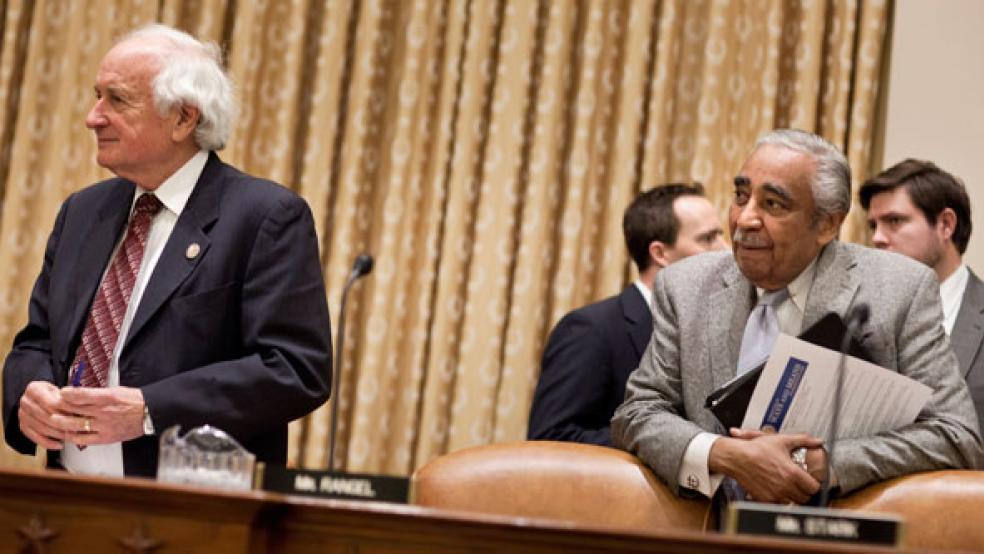How low can the corporate tax rate go? If all corporate tax expenditures were axed, the lowest the rate could go and remain revenue neutral would be 28 percent according to a new analysis from the Joint Committee on Taxation.
The report, which was requested by Democrats on the tax-writing Ways and Means Committee, calculates eliminating virtually all corporate tax breaks and subsidies including those for the oil and gas industry, domestic manufacturers, and manufacturing equipment. Although the joint committee says the estimates are “preliminary,” they unleash a new layer of doubt on whether the U.S. can afford to slash the top corporate tax rate substantially without adding to the federal deficit.
Lowering the corporate tax rate from 35 percent to 28 percent would mean $717.5 billion less revenue for the Treasury over a decade, as well as $243 billion in what the report called “interactions” between the resulting tax law changes, according to the report. That calculation excludes tax breaks for “pass through” entities —small businesses where net income is taxed at the personal rate. The report also noted that its data doesn’t account for how businesses might amend their tax structure based on the elimination of corporate tax breaks.
The chairmen of the House Ways and Means and Budget committees as well as scores of business leaders have repeatedly endorsed slashing the top corporate tax rate from 35 percent to 25 percent in order to make U.S. businesses more competitive with foreign counterparts and better able to invest in the U.S. Earlier this year at a Ways and Means hearing, chief financial officers from United Technologies Corp., Zimmer Holdings, and Kimberly-Clark asked Congress to lower the corporate rate to the mid-20 percent range in exchange for repealing their tax preferences.
But Democrats, like House Ways and Means ranking member Sander Levin, D-Mich., point to the new data as proof that only doing away with corporate tax breaks can’t fund the large rate cut they are clamoring for, and that more offsets are needed. Republican tax reform ideas have “disturbing implications,” and are nowhere near complete, Levin said in a note to reporters. “The Republican tax plan would require wiping out every provision in our tax code that encourages domestic job creation, investment and innovation – and they are still 3 percent short of their goal,” Sander said in a statement. “Will that revenue come from individuals or from small businesses? Or will Republicans try to use budget ploys such as so-called ‘dynamic scoring’ to attempt to make up the difference?”
According to tax experts, the JCT report is mostly timed to attack Ways and Means chairman Dave Camp, R-Mich., who last week unveiled a draft proposal to overhaul the tax code which presumes the top corporate rate drops to 25 percent but doesn’t stipulate how it would be offset. Camp’s office describes the report itself and Levin’s reaction to it as a symbol of Levin’s “blatant opposition to tax reform.”
“This latest political stunt—asking a very narrow question which Levin knows well will yield a very narrow response—is just another in his ongoing attempts to detract from the serious work being done on a bipartisan, bicameral basis to reform our tax code so that employers can create jobs,” said Camp spokesperson Michelle Dimarob.
Camp’s discussion draft proposes shifting the U.S. to a territorial tax system, exempting most of the profits U.S. multinationals earn abroad from U.S. taxes. U.S. law currently allows multinationals to defer paying corporate income taxes on profits earned overseas until they are brought back into the U.S.—a practice which encourages U.S. corporations to stash money abroad rather than invest it in the U.S. Camp says his proposal would entice U.S. multinationals to reinvest those profits in the U.S. He says he will release further details on how the corporate rate would be knocked down to 25 percent later.
“Of course we want to do this [tax reform] in a revenue-responsible manner, but 25% is what you need to basically have a rate that is competitive with OECD countries … you shouldn’t fault Congressman Camp for using that goal as a placeholder,” said Caroline Harris, chief tax counsel with the U.S. Chamber of Commerce.





